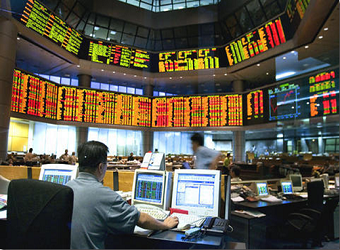Most Asian indexes climbed on Thursday after last session’s rally stalled late in the trading day. Gains in the region followed the slightly lower close seen on Wall Street as U.S. bond yields rose.
In Tokyo, the Nikkei 225 jumped 1.42 percent after closing barely in positive territory in the last session. Financials, automakers and manufacturers traded higher: Toyota rose 2.74 percent, Fanuc Manufacturing gained 3.96 percent and Mitsubishi UFJ Financial Group was up 1.12 percent.
Technology shares were mixed: Nikon advanced 1.44 percent while Nintendo slid 0.94 percent.
Reinsurance company Swiss Re said it was in talks with SoftBank over a “potential minority investment.” According to the Wall Street Journal, SoftBank is looking for an up to $10 billion stake in the company.
Separately, the Japanese conglomerate announced on Wednesday it was making preparations to list its domestic telecommunications arm, SoftBank Corporation. Shares of SoftBank reversed early losses to climb 0.61 percent.
In Seoul, the Kospi gained 1.04 percent after finishing in negative territory on Wednesday. Heavily weighted technology stocks gained, with chipmaker SK Hynix climbing 3.94 percent to extend last session’s gains.
Samsung Electronics gained 1 percent, appearing to shrug off news that its chairman, Lee Kun-hee, was suspected of tax evasion.
South Korean manufacturers were a mixed picture. Steelmaker Posco traded flat, Hyundai Steel edged up 0.37 percent and Samsung Engineering added 0.33 percent.
Down Under, the S&P/ASX 200 edged up 0.24 percent as losses in the energy and materials sectors were offset by gains in the heavily weighted financials sub-index, which rose 0.75 percent. Hong Kong’s Hang Seng Index rose 0.72 percent. Among blue chips, HSBC traded higher by 0.75 percent and tech giant Tencent advanced 1.64 percent.
Hong Kong’s Hang Seng Index rose 0.72 percent. Among blue chips, HSBC traded higher by 0.75 percent and tech giant Tencent advanced 1.64 percent.
Wynn Macau stock jumped 7.4 percent after resuming trade on Thursday. The pop in share price came after casino mogul Steve Wynn’s departure as CEO and chairman of Wynn Resort on Wednesday following allegations of sexual misconduct, which Wynn denied.
Indexes on the mainland traded mixed after lagging other regional indexes in the last session: The Shanghai composite slid 1.66 percent while the Shenzhen composite rose by 0.92 percent.
Trade data released on Thursday showed dollar-denominated imports in January rose 36.9 percent, topping the 9.8 percent forecast in a Reuters poll. Meanwhile, exports in dollar terms increased 11.1 percent, above the 9.6 percent projected. The country’s trade surplus, however, missed expectations.
Even with the impact of the upcoming Lunar New Year holiday considered, the robust import data reflected domestic demand momentum was healthy, said Louis Kuijs, head of Asia economist at Oxford Economics.
The yuan looked poised for its worst day in a year, with the currency declining almost 1 percent in the morning. Earlier, the People’s Bank of China on Thursday had set the yuan midpoint at 6.2822 per dollar, its highest level in two and a half years.
Shares of Rio Tinto slipped 0.98 percent after the mining company on Wednesday announced a record full-year dividend of $5.2 billion, or $2.90 per share. That came as the company’s underlying earnings for 2017 rose 69 percent to $8.63 billion. The miner also announced a $1 billion share buyback.
Among other individual movers, Australia’s AMP bounced 3.58 percent after the wealth manager on Thursday announced a full-year profit of 1.04 billion Australian dollars ($813 million), which was more than double its profit the year before.
Singapore’s DBS Group on Thursday announced that its fourth-quarter profit rose 33 percent to 1.22 billion Singapore dollars ($905 million), in line with the S$1.2 billion projected in a Thomson Reuters poll. DBS stock was up 3.15 percent.
U.S. stocks finished lower despite climbing earlier in the session, with the S&P 500 recording its largest one-day reversal since February 2016. The indexes pared early gains in afternoon trade following a rise in the yield of the 10-year U.S. Treasury note.
On Thursday, the yield on the 10-year Treasury note stood at 2.8276 percent during Asian trade.
The move higher in the yields also came amid news that U.S. Senate leaders had come to an agreement over a two-year budget agreement.
Moves in the U.S. markets came after several volatile sessions of trade stemming from concerns over rising interest rates, which saw equities sharply sold off. Traders also blamed program trading for the steep declines.
The greenback took a pause after firming overnight. The dollar index, which tracks the U.S. currency against a basket of rivals, traded at 90.353 at 1:12 p.m. HK/SIN, but remained above the 89 handle seen for most of the past two weeks.
Meanwhile, the dollar firmed against the yen to trade at 109.61 yen.
The euro was stable at $1.2266, but traded near its overnight low of $1.2245. The currency’s decline in the last session came despite news of a breakthrough in coalition talks in Germany.
Elsewhere, the New Zealand dollar slid to a one-month low after the country’s central bank kept interest rates on hold earlier in the day. The kiwi dollar slipped 0.53 percent to trade at $0.7194.
Markets will also keep an eye on the Philippine central bank, which will make its interest rates decision later in the day.
On the commodities front, oil prices extended losses after touching their lowest levels in one month in the last session following data that showed U.S. crude inventories and production rose last week.
U.S. crude futures inched lower by 0.36 percent to trade at $61.57 per barrel after settling more than 2 percent lower on Wednesday. Brent crude futures shed 0.21 percent to trade at $65.37.
Source: CNBC
